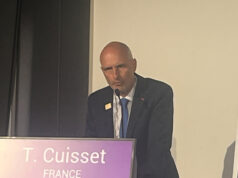
Jenscare has announced the release of 30-day follow-up results of the TRINITY trial of the LuX-Valve Plus transcatheter tricuspid valve replacement (TTVR) system, presented at EuroPCR 2025 (20–23 May, Paris, France) by Thomas Modine (CHU de Bordeaux, Bordeaux, France).
TRINITY is a global prospective, multicentre, single-arm clinical trial, which primarily aims to evaluate the safety and efficacy of LuX-Valve Plus patients with severe tricuspid regurgitation (TR) deemed to be at high surgical risk. The study enrolled 161 patients from 20 centres around the world, among which, 18 centres were from France, Germany, Spain, Denmark, and the UK.
Patients were aged on average 77 years old, with an average Society of Thoracic Surgeons (STS) score of 9.92% (14.45% of roll-in group). Among the full analysis set (FAS), 72.48% of the patients has atrial fibrillation (AF), 32.20% had prior left heart surgery/intervention, 26.85% had a pacemaker or implantable cardioverter defibrillator (ICD) implanted.
For the trial’s roll-in group, 91.76% of the patients had AF, 41.67% had prior left heart surgery/intervention, 25% had pacemaker/ICD implanted. The presence of comorbidities contributed to a poor baseline and increased the risks of surgical treatment or difficulties of other interventional therapies.
Over 75% of those treated utilised valve sizes between 55–70mm. The results showed that the device success rate stood at around 97%, with an average operation time of around 41 minutes.
On safety, the cardiovascular events committee (CEC)-adjudicated composite events rate at 30 days stood at 14.8% of FAS group and 14.9% with the roll-in group included. For the FAS group, cardiovascular mortality stood at 1.3%, whilst the incidence of strokes and non-selective tricuspid/valve surgery/intervention post-procedure were both 0.7%, major cardiac structural complications stood at 2%, severe bleeding (including fatal, life-threatening and extensive bleeding as defined by MVARC) 4%, new pacemaker implantation due to atrioventricular block is 8.7%.
There were no incidences of myocardial infarction (MI), new onset renal failure, major access site and vascular complications, and device-related pulmonary embolism. For the roll-in group, both non-selective tricuspid/valve surgery/intervention post procedure and new pacemaker implantation showed one event. No incidences of cardiovascular mortality, myocardial infarction, strokes, new onset renal failure, severe bleeding, major cardiac structural complications, and device-related pulmonary embolism were seen.
The efficacy indicators show that the TR grade, New York Heart Association (NYHA) classification, and quality of life (QoL) improved significantly at 30 days. For the FAS group, 95.7% of patients had moderate or less TR, with 84.1% in NYHA class I or II. Kansas City Cardiomyopathy Questionnaire (KCCQ) scores increased by around 14 points on average. For the roll-in group, 91.7% of patients had moderate or less TR, whilst 58.3% recorded NYHA class I/II. KCCQ scores increased by around 18 points on average.










